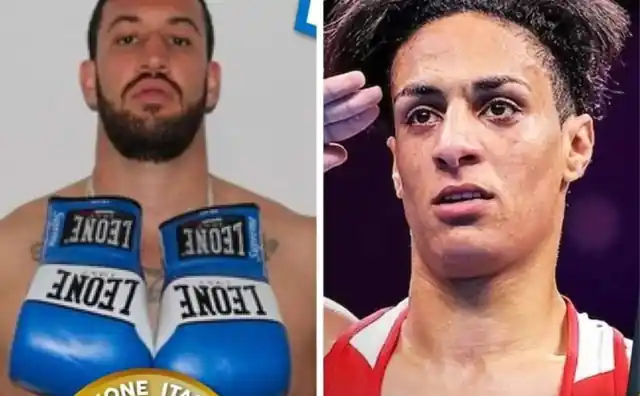
Italian boxing champion Gianmarco Cardillo has disclosed that he has been feeling like a woman for the past 15 days.
This announcement comes amidst a backdrop of controversy involving Algerian boxer Imane Khelif, who recently defeated Cardillo’s compatriot, Angela, in a highly contentious match at the Paris Olympic tournament.
Cardillo has expressed a strong desire to fight Khelif, who has become a polarizing figure in the boxing world. Khelif’s victory in the 1/8 finals against Angela, achieved in just 46 seconds, has raised eyebrows and sparked debates about fairness in the sport.
Angela cited the severity of Khelif’s punches as the reason for her decision to stop the match to avoid further injury.
The controversy surrounding Khelif is intensified by her unique position in the competition. She is one of the two female boxers with male chromosomes permitted by the International Olympic Committee (IOC) to compete against women at the Games.
This decision has not sat well with many in the boxing community and beyond. Serbian President Aleksandar Vucic was vocal in his disapproval, expressing his concerns on the matter.
“Men come, beat women, and take medals. Madness has started to rule the world and everyone has gone crazy,” he stated, reflecting a sentiment shared by many who believe the inclusion of athletes with male chromosomes in women’s sports compromises the integrity of the competition.
However, not everyone is critical of Khelif. Her aunt, Nadia, passionately defended her niece during an appearance on Nova TV.
“I think what’s happening is a great injustice to an athlete of her stature. They are unfairly targeting her. She underwent medical tests which revealed atypical results for a woman, but she is not to blame for this. She is not a man,” Nadia asserted.
Nadia recounted Khelif’s lifelong passion for boxing and her successful career, which had been largely controversy-free until recently.
Despite her numerous accolades and the support of her family and nation, Khelif faced significant challenges starting with the World Boxing Championships in India last year.
“We didn’t understand why this was happening. She started from scratch but was expelled from the tournament. We were disgusted and confused by this setback,” Nadia explained.
The emotional toll on Khelif has been substantial. “Imane is a true athlete, supported by her family and the entire Algerian nation. However, she is deeply affected by these events. If she didn’t have this support, she might have crumbled,” Nadia said, highlighting the personal struggles Khelif faces amidst the ongoing controversy.
Nadia emphasized that the criticism directed at Khelif feels like a deliberate attempt to undermine her achievements.
“She shines like a star, and it feels like they want to bring her down. This is a tremendous blow to our family and reflects a huge injustice,” she concluded, underlining the emotional and reputational impact on Khelif and her loved ones.
Cardillo’s revelation adds another layer to this complex situation. His announcement about feeling like a woman and his desire to challenge Khelif can be seen as a bid to draw attention to issues of gender identity and fairness in sports.
As the debate continues, it underscores the need for nuanced discussions and policies that consider the perspectives and rights of all athletes involved.
The controversy surrounding Khelif’s participation in the Olympics is far from over. As discussions about gender identity and sports fairness gain momentum, the sports community and governing bodies like the IOC will be under increasing pressure to address these complex issues in a manner that ensures fair competition while respecting the identities and rights of all athletes.
This article was created using automation technology and was thoroughly edited and fact-checked by one of our editorial staff members